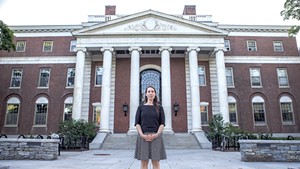
- File: James Buck
- The University of Vermont campus
A month after they were
sent home and forced to take classes online in response to the coronavirus outbreak, some University of Vermont students want their money back.
A new federal class-action lawsuit filed Tuesday in U.S. District Court accuses UVM of failing to adequately reimburse students who did not get "what they bargained for" when paying for the 2020 spring semester.
New Hampshire-based law firm Ice Legal filed the suit on behalf of two UVM students: Nilay Kamal Patel, of the United Kingdom, and Rachel A. Gladstone, of New York. If a federal judge certifies the suit's class-action status, it would cover anyone sent home early after paying for tuition, on-campus housing, meal plans or other fees.
The plaintiffs accuse UVM of unjustly enriching itself off the backs of students who are not receiving the traditional, in-person learning experience they paid for. They demand a partial tuition reimbursement for the "difference in value" between online and in-person learning and a prorated refund of the other costs.
Ariane Ice, the platinffs' attorneys, declined to comment Wednesday, telling
Seven Days she would prefer to let the suit "speak for itself." A UVM spokesperson did not immediately return a request for comment.
The suit could have far-reaching implications in the world of higher education at a time when colleges around the country are feeling the strain of sending students home early due to the pandemic. Some have agreed to prorated refunds. Others have only offered limited reimbursements, prompting similar lawsuits
in recent weeks.
UVM encouraged students not to return to campus after their spring break ended March 12. It switched to remote learning full-time on March 18, and five days later announced that students
would not be returning to Burlington to finish the school year.
While the suit recognizes the university's efforts to continue educating students, it argues that the plaintiffs' learning experiences have been "stymied and disrupted."
"Studies have shown that students do not perform as well in an online setting such that their grades, as well as their performance in future classes, are negatively affected," the suit reads.
To further prove its case, the suit calls on UVM's own marketing, which promises of a "diverse community of thinkers and doers," a "bustling campus with something always going on" and an "outdoor paradise in one of America's best college towns."
"UVM promised different learning environments, only a small fraction of which was online," the suit says.
The filing also argues that UVM has inadequately reimbursed students who paid to live on campus or access meal plans, offering them only "minimal" and "inadequate" future credits.
For example, students paid their room and board fees — which average more than $13,000 — with the expectation that they would be moving out in early May, the suit said.
The university, meanwhile, only offered those who moved out by March 30 a $1,000 housing credit, according to the suit. In comparison, Middlebury College has offered prorated refunds starting at $1,000 and capped at $4,380,
according to its website.
UVM's gesture hasn't played well with its student body. Nearly 8,000 people have signed an online petition
demanding the university partially refund housing and meals costs.
One student's parent has even filed a formal consumer complaint against UVM. Christine DeAmbrose wrote to the Vermont Attorney General Office's Consumer Assistance Program earlier this month on behalf of a group of parents who wanted to know whether there was any way to force UVM to return a more "reasonable amount" for room and meals fees. DeAmbrose said she and other parents were "stung" by UVM's implication that they should be grateful to receive the housing credit.
"I, for one, am not feeling very grateful, and my daughter is paying 8% on that borrowed money for which she received only a few weeks of 'return,'" DeAmbrose wrote. "We need to protect our kids who are already going to be burdened by the heavy weight of this pandemic on top of loan debt.
"I am well aware and sensitive to the fact that we are in uncharted waters," she continued. "But I also find it criminal that the school can simply, arbitrarily, keep the money without us having received the services and goods we paid for? How is this legal?"
The lawsuit contends that it's not, pointing out that while UVM's housing and meal plan contract says it can be terminated in the event of a "calamity or catastrophe," like an "influenza pandemic," the university can
only keep those fees if it closes entirely, which it has not.
The suit lands as UVM works to confront substantial losses caused by the pandemic. Last week, UVM student newspaper the
Vermont Cynic reported that university president Suresh Garimella sent a letter to state officials requesting a $25 million slice from Vermont's $1.2 billion federal stimulus package.
Included in Garimella's one-time funding request: $5.5 million to cover the student housing credit, $5 million to help UVM "survive and thrive" in a changing educational environment, and $8 million to bolster financial aid in anticipation of the pandemic's economic impact on families.
"We anticipate that a large portion of our student body will have substantially higher financial needs next year due to the inability to work over the summer and due to their family's changed financial circumstances," Garimella wrote.
Here's the full lawsuit:



















Comments
Comments are closed.
From 2014-2020, Seven Days allowed readers to comment on all stories posted on our website. While we've appreciated the suggestions and insights, right now Seven Days is prioritizing our core mission — producing high-quality, responsible local journalism — over moderating online debates between readers.
To criticize, correct or praise our reporting, please send us a letter to the editor or send us a tip. We’ll check it out and report the results.
Online comments may return when we have better tech tools for managing them. Thanks for reading.